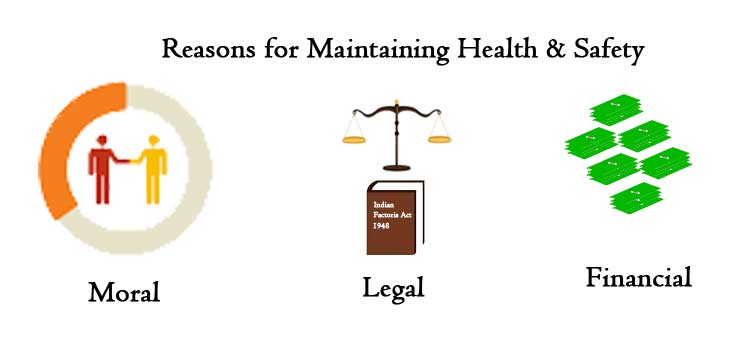Three Key Reason for maintaining good standards of health and safey at the work place are:
Moral Reasons
It is a prime motivator to manage risks, empoyer to maintain moral code within the society.
Legal Reasons
Law requires responsible to manage health and safety at work, any breach can lead to legal actions.
Financial Reasons
Accidents results in loss of money or financial loss to business.The Possible Reasons for maintaining good standards of health and safety at the work place:
Moral Reasons
It is a prime motivator manage risks at the work place, the employer to maintain moral code within the society. Without it, employers can treat health and safety as low importance than financial profits. Employer owe a “duty of care” towards his employees, the employee does not expect to risk his life and limb or ill health as, part of his employment. Society Expects every employer to demonstrate a correct attitude towards health and safety, it is unacceptable to place an employee in a situation where there is a risk to his life. The Employer has moral obligation to protect his employees and others health and safety who might be affected by their business undertakings, for instance, visitors, trespassers or public etc.,
Legal Reasons
The moral reasons have been turned into health and safety Law, UK’s Common Law judgements. The UK’s Health and Safety at Work, etc, Act 1974(HSWA), and Regulations made under the law, follows a long list of legal requirements that reinforce the “duty of care”. Many countries have introduced their own legal duties to protect the workers from harm.
Law requires resonsible person to manage health and safety at workplace, any breach of legal requirement shall impose legal actions.
The following are the strong reasons for employer to manage risk legally:
Preventive – to prevent enforcement notices (improvement or prohibition) from the enforcement agencies.
Punitive – criminal courts impose fines and imprisonment for breaches of legal duties. These punishments can be given to the company or to individuals within the company.
Compensatory – employees / victim can sue employer in the civil courts for compensation.
Economic
Accidents and ill-health involves costs, the indirect costs involved are often considerably more expensive than direct costs. The financial burden placed on employers is often a key factor in the ownership and development of safety management systems that will help to reduce the costs of failure and sub-standard practice at work.
Direct Costs: These are the measurable costs which are directly associated with the accidents and involves payment of money.
For e.g.
– Compensation pay outs.
– Victim Sick pay.
– Fines from criminal court.
– Machinery repair costs
Indirect Costs: These are the costs which are arise as a consequence of the event, indirect costs are often difficult to quantify, they are more substantial than direct costs.
For e.g.
– Loss of worker morale (will have impact in productivity and culture.
– Supervisor Time spent on investigation and preparing reports.
– Recruiting and training new employees.
– Loss of business reputation and goodwill
